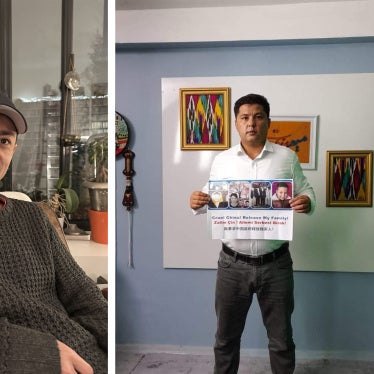H.E. Dr. Anwar Mohammed Gargash
Minister of State for Foreign Affairs
Minister of State for Federal National Council Affairs
Ministry of Foreign Affairs
United Arab Emirates
Your Excellency:
I write in response to the public statement issued from the Ministry of Foreign Affairs on October 24, 2014 regarding Human Rights Watch’s report, “I Already Bought You”: Abuse and Exploitation of Female Migrant Domestic Workers in the United Arab Emirates.
We welcome the UAE’s stated commitment “to the continuous strengthening of protections for foreign workers, including migrant domestic workers, as a national priority.” For its part, Human Rights Watch is committed to fair and accurate reporting and will be pleased to engage with the UAE government in any way appropriate to assist it to ensure full protection of the rights of domestic workers.
I understand that you expressed dissatisfaction with Human Rights Watch’s engagement with your government when you met with my colleagues Sarah Leah Whitson and Nisha Varia last September, as well as an interest in extending our dialogue to improve our interactions. I wish to take this opportunity to reaffirm our wish to continue our dialogue to improve our constructive engagement with Your Excellency and other relevant UAE authorities, particularly on the issues of protection of domestic workers’ rights.
As Your Excellency is aware, we made repeated efforts to correspond with UAE authorities while undertaking research for our recent report. In particular, we wrote letters to15 separate UAE ministries, bodies and officially-established organizations in January, April, and August 2014, with hopes that we could obtain information and insight from your administration well in advance of publication of our report. As yet, I regret to note that we have received no responses except for one letter from the Dubai Foundation for Women and Children and a separate referral to the publications of the National Committee to Combat Human Trafficking.
Human Rights Watch acknowledges the steps taken by the UAE government to improve protections for migrants and referenced these in its recent report, summarizing them on page 17 of the report. We remain concerned, however, that some of the improved protections either do not apply to domestic workers or fail to sufficiently address factors that put domestic workers at risk of abuse. Our responses to the specific comments and assertions contained in the Foreign Ministry’s statement are set out in the attached document.
I particularly note and welcome the reference in the Foreign Ministry statement to the UAE government’s commitment “to strive to improve working conditions and to cooperate constructively with relevant international organisations to this end.” Human Rights Watch will be pleased to assist the UAE authorities to achieve this goal and requests an early meeting with Your Excellency and meetings with other appropriate UAE officials towards this end. In the meantime, my colleague Rothna Begum can be contacted at XXXXX or on XXXXX to answer any questions you may have regarding the report, which we attach here again for your information.
Thank you for your attention to this matter.
Sincerely,
Liesl Gerntholtz
Director Women’s Rights Division
Response to the UAE Foreign Ministry’s statement to Human Rights Watch report
Conclusions based on sample size
The UAE statement criticizes the Human Rights Watch report for making “sweeping conclusions based on a small, unrepresentative sample.”
The Human Rights Watch report cautioned specifically, on page 10, that the interviews on which the report was based provide no basis for statistical claims as to the prevalence of abuses against domestic workers in the UAE. Human Rights Watch insists, however, that the interviews it conducted shed valuable light on the abuses that some domestic workers in the UAE suffer and on the authorities’ response to such abuses. We also noted that many domestic workers in the UAE enjoy good working conditions and are able to remit salaries to their families abroad. Overall, our findings on conditions faced by workers reflect many years of reporting on migrant worker abuses by Human Rights Watch and other organizations and media, which show a persistent, repeated pattern of abuses that result from legal and institutional shortcomings.
Human Rights Watch conducted interviews with migrant domestic workers of different nationalities, who spoke different languages, were not known to and had no contact with one another, and who were interviewed in various places and settings. They reported a broadly consistent range of experiences and types of abuse by employers, recruitment agents, and others. Their evidence points both to multiple similar violations of the rights of at least some migrant domestic workers in the UAE and a lack of adequate mechanisms of redress when abuses occur.
The kafala system
According to the Foreign Ministry statement, domestic workers can transfer to a new employer at the end of their contract. However, this option is available to them only with their employer’s consent, effectively trapping workers who have abusive employers. While recent reforms allow certain migrant workers to apply to the Ministry of Labour to transfer employers if their employer has breached contractual obligations, the government has not extended this important reform to domestic workers.
Human Rights Watch is calling on the UAE authorities to reform the UAE’s kafala system to ensure that domestic workers can legally transfer or terminate employment at will and without their employer’s consent.
Standard domestic workers contract and labor law protections
Human Rights Watch welcomes the 2014 revision of the UAE standard domestic workers contract so as to guarantee domestic workers a minimum of 8 hours of rest each day, one day of leave from work per week or compensation equal to that day’s work, and an annual paid vacation of 30 days.
Human Rights Watch remains concerned, however, about a provision in the new contract that allows employers to make deductions from a domestic worker’s salary for any damage “or loss of any goods or property” that the employer considers “attributable to default or negligence” on the part of the worker. This would appear to open the way for unfair deductions by employers of pay owed to domestic workers.
Human Rights Watch is concerned also that the new standard contract for domestic workers sets out fewer and weaker requirements as regards conditions of work than those contained in UAE labor law, from which domestic workers are still excluded. For example, the eight hour rest period means that domestic workers face up to 16-hour workdays, while the contract makes no provisions for overtime pay (other than as compensation for working the weekly day off), and no provisions to compensate workers in case of work-related injuries. Since 2012, the UAE authorities have said that they have prepared a draft law to regulate domestic work but two years on, they have yet to make it available for public comment, much less to implement it. It is in all events disturbing that media reports indicate that the purported draft law fails to extend labor protections to domestic workers equal to those available to other workers under the main labor law, and fall short of the standards set out in the 2011 ILO Convention Concerning Decent Work for Domestic Workers.
The Foreign Ministry statement makes reference also to the work of the UAE Ministry of Interior with governmental and non-governmental institutions, including embassies and consulates of countries of origin, to seek solutions to problems faced by domestic workers. As you are aware, there has unfortunately been no such discussion with Human Rights Watch, which has investigated issues relating to migrant workers for the past decade. Furthermore, our research suggests there is in fact a lack of coordination on mutually enforceable contracts between labor-sending countries and the UAE has resulted in many workers receiving two different contracts—one before departure from their home country and a second, invariably less favorable contract, when they arrived in the UAE. Many of the workers Human Rights Watch interviewed reported that they had received a lower salary and less favorable conditions of work in the UAE than they had been promised when initially recruited. The UAE authorities have stated that the revised model contract is intended partly to address this problem, but without effective consultation and coordination between the UAE and labor-sending countries, contract substitution is likely to continue.
Human Rights Watch urges the UAE government to adopt a domestic workers law that both conforms to the relevant international standards and affords domestic workers protections equivalent to those that UAE labor law affords other workers. The government should cooperate with labor-sending countries to develop and implement a harmonized contract that supplements the law, and make it mutually enforceable. The government should also expedite dispute-resolution for domestic worker complaints within a time bound period, and allow workers who have faced abuse to leave the UAE and return home, or to transfer their employment within the UAE. The government should also establish a labor-complaints court for domestic workers’ complaints; all complaints that do not reach a fair resolution should be referred to this court. This court should also resolve complaints within a time-bound period.
Reforms on human trafficking in the UAE
The Foreign Ministry statement lists a series of measures that the UAE has undertaken to combat human trafficking. As Human Rights Watch noted in its report, the UAE deserves credit for taking these initiatives but additional action is needed. In particular, the UAE’s anti-human trafficking efforts have focused almost entirely on trafficking for purposes of sexual exploitation, while neglecting the issue of trafficking into forced labor, including domestic servitude. Consequently, if the UAE authorities are to eradicate all forms of human trafficking, they should address and radically reform the kafala system and existing labor law to prevent structural conditions that foster abuse and forced labor. In addition, the UAE Ministry of Justice should train public prosecution officials to identify, investigate, and prosecute cases of forced labor, slavery, and trafficking of persons in all forms.
Awareness-raising and monitoring of recruitment agencies
The Foreign Ministry statement refers also to a “number of awareness-raising initiatives by the Ministry of Interior” that target domestic workers and recruitment agencies. Human Rights Watch would welcome receiving more details of these, including their content, format, and frequency.
In its report, Human Rights Watch noted that some government-sponsored advertisements and statements by officials have carried exaggerated warnings that sponsors who abuse domestic workers could expose themselves to retaliation, which in turn could cause a backlash against domestic workers. Such advertisements are not helpful because they portray domestic workers as potential criminals which fuel suspicion and negative attitudes towards workers, and put domestic workers at increased risk, rather than changing attitudes to show that domestic workers are workers with rights in order to encourage more humane treatment.
Instead, the authorities should regularly inform employers of their rights and responsibilities under UAE law, including the penalties they face for mistreatment of domestic workers, and stipulate that both employers and domestic workers should attend officially-sponsored orientations regarding their respective rights and obligations.
Human Rights Watch welcomes the Foreign Ministry’s announcement that the “The Ministry of Interior has established a committee to examine domestic worker recruitment agencies, detect any violations of applicable laws, and make recommendations to better protect domestic workers.” This appears to represent a positive step forward, and Human Rights Watch will be pleased to receive more details of this committee and to share its findings concerning abuses by recruitment agencies with the committee.
Immigration department
The General Directorate of Residency and Foreigners Affairs within the Ministry of interior receives complaints from domestic workers and assists in mediation between workers and other parties. In its report, Human Rights Watch noted that interviewees generally spoke positively about the department’s conduct of its mediation functions, although some expressed concerns, notably that immigration department officials failed to inform them adequately about the timelines for resolving their claims and over translation problems. A fear that they would risk deportation or face other penalties for “absconding” may deter some workers from filing valid complaints with the immigration department.
The Foreign Ministry statement refers to a toll-free hotline (8005005) for workers to submit complaints but does not indicate whether it operates on a 24 hours per day basis, in what languages assistance is available, or any measures taken to publicize the hotline among domestic workers. Human Rights Watch would welcome clarification of these details from the UAE authorities.
Human Rights Watch urges the Ministry of Interior and Labour to create a domestic work inspection task force to monitor working conditions for this sector and expedite dispute-resolution for domestic worker complaints.
Shelters
The Foreign Ministry statement notes that “individuals (victims of violence or abuse) are referred by the Public Prosecution to the Ministry of Interior’s social support centres,”but fails to indicate whether such referrals include domestic workers, and if so, how many domestic workers have been the subject of such referrals in recent years.
The statement also says that “Domestic workers may also seek assistance from shelters provided by civil society organisations, such as the Dubai Foundation for Women and Children. “In a letter dated September 15, 2014, the Dubai Foundation for Women and Children told Human Rights Watch that it dealt with 78 cases involving domestic workers from 2009 to 2013, 66 of whom were women who were trafficked into the UAE as domestic workers but forced to work in the sex industry. They saidthe12 other domestic workers assisted by the Foundation had been subjected to violence either by their employer or by members of their employer’s family. These relatively low numbers point to a possible unmet need for services for domestic workers who are subject to abuse and/or trafficked into forced labor.
Human Rights Watch urges the UAE authorities to increase the provision of emergency shelters and other assistance for domestic workers fleeing abuse, and to ensure that workers who stay at such shelters do so of their own volition and are not confined or held against their will. The authorities should also do more to publicize the existence of emergency shelters and other assistance, and to disseminate contact and other information to domestic workers in a range of relevant languages.
In conclusion, Human Rights Watch welcomes the UAE’s stated commitment that it “will continue to strive to improve working conditions and to cooperate constructively with relevant international organisations to this end” and looks forward to meeting with the government concerning measures it can take to improve the working conditions of migrant domestic workers.








